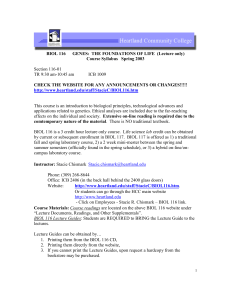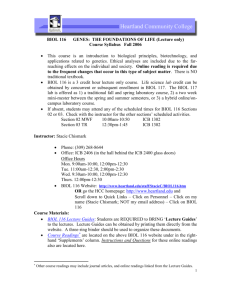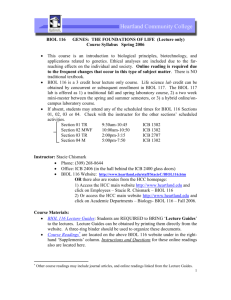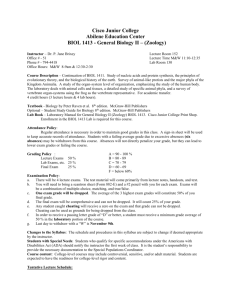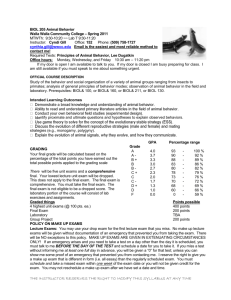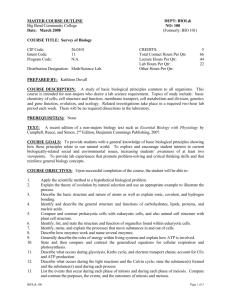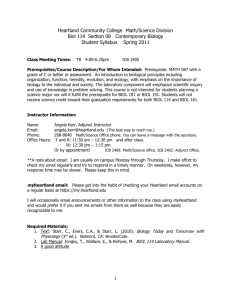biol 116 chismark - Heartland Community College
advertisement
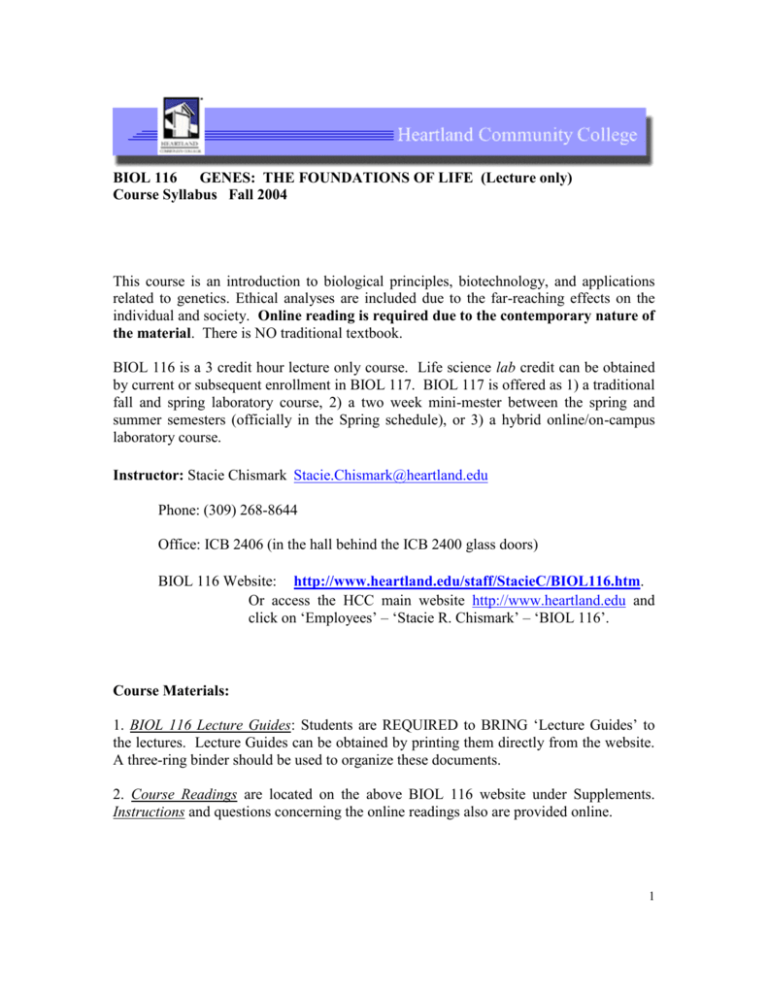
BIOL 116 GENES: THE FOUNDATIONS OF LIFE (Lecture only) Course Syllabus Fall 2004 This course is an introduction to biological principles, biotechnology, and applications related to genetics. Ethical analyses are included due to the far-reaching effects on the individual and society. Online reading is required due to the contemporary nature of the material. There is NO traditional textbook. BIOL 116 is a 3 credit hour lecture only course. Life science lab credit can be obtained by current or subsequent enrollment in BIOL 117. BIOL 117 is offered as 1) a traditional fall and spring laboratory course, 2) a two week mini-mester between the spring and summer semesters (officially in the Spring schedule), or 3) a hybrid online/on-campus laboratory course. Instructor: Stacie Chismark Stacie.Chismark@heartland.edu Phone: (309) 268-8644 Office: ICB 2406 (in the hall behind the ICB 2400 glass doors) BIOL 116 Website: http://www.heartland.edu/staff/StacieC/BIOL116.htm. Or access the HCC main website http://www.heartland.edu and click on ‘Employees’ – ‘Stacie R. Chismark’ – ‘BIOL 116’. Course Materials: 1. BIOL 116 Lecture Guides: Students are REQUIRED to BRING ‘Lecture Guides’ to the lectures. Lecture Guides can be obtained by printing them directly from the website. A three-ring binder should be used to organize these documents. 2. Course Readings are located on the above BIOL 116 website under Supplements. Instructions and questions concerning the online readings also are provided online. 1 Student Responsibilities: 1. Students must review the syllabus periodically to refresh their memory concerning information provided therein. 2. Students must attend and actively participate in all lecture and group sessions. Bring appropriate materials to class (Lecture Guides). Complete assignments, using the required format, and turn them in on time. Take exams/quizzes as scheduled. 3. Students must read and spend enough time in independent study to master the material. If the student is having difficulty with a particular topic, he or she should contact the instructor. Tutors may be available at the Academic Support Center (ASC) in the library area. 4. Take thorough notes in lecture; write down everything the instructor writes and says. It is the student’s responsibility to ask the instructor for clarification or, if absent, to obtain copies of the notes from another student. The instructor will not provide lecture notes. Student Contacts: 5. Study often and early for exams. Do not procrastinate. Students should follow the instructions in the Self-Tests found at the end of the Lecture Guides. They are an invaluable resource for exams. Answer the online reading questions. Write down questions to ask before the lectures and exams. 6. Students must exhibit courtesy and respect for their fellow students. TURN OFF CELL PHONES. ONE WARNING WILL BE ISSUED FOR INAPPROPRIATE TALKING OR BEHAVIOR DURING CLASS. A SECOND OFFENSE WILL RESULT IN DISMISSMISAL FROM THE COURSENO EXCEPTIONS. 7. Students are responsible for recording their grades (Syllabus, Page 7) and determining their final course grade. Course Policies 1. ACCOMMODATIONS FOR EMERGENCIES AND DIFFERING PRIORITIES ARE PROVIDED IN THE COURSE POLICIES. These accommodations will not be altered. Special privileges will not be secretly given to any student. This assures that all will receive fair and equal treatment. Students are required to read the syllabus and sign a contract stating that they understand and will abide by the syllabus policies. If for some reason a student cannot abide by these policies, he/she should not sign the contract and must contact the instructor immediately. Contract due date: 2 2. EXAMS: FIVE REGULAR EXAMS AND TWO QUIZZES. Accommodations for emergencies: If you miss one of the first four exams because you are sick, attending a funeral, in a coma, have been kidnapped, going on a trip, miss your bus, your car breaks down, etc., the exam grade will be dropped without penalty. ONLY USE THIS OPTION IN CASE OF AN EMERGENCY. A poor grade on a previous exam is not an excuse to make up a missed exam. If all of the first four exams are taken, the lowest of these will be dropped (Exam 5 is NOT dropped). Comprehensive Final Exam: See page 7 of the syllabus. Cheating will result in an automatic “F” in the course. Exam grades are returned at the following lecture session. In addition, students are responsible for recording and calculating their own grades. Grades will NOT be emailed to students. 3. ASSIGNMENTS One assignment is a group project requiring attendance and participation. This assignment will involve several lecture periods. If a student misses one of these lecture periods, 75% of the project grade will be deducted. The remaining 25% only will be awarded if the appropriate material is turned in correctly, completely, and on time. 4. ATTENDANCE Although attendance may be taken, it is not included as part of your grade. College students are adults with priorities, and these may involve missing class. However, your grade in the course will reflect the priority you give it. 5. TARDIES: Tardies are disruptive. Scheduled class times reflect the start of the lecture, not when students should walk through the door. Please let the instructor know if there are extenuating circumstances that may cause tardies. 6. SYLLABUS DISCLAIMER This syllabus is subject to change. It is your responsibility to attend lectures or, if absent, communicate with student contacts or the instructor for any verbal or written changes. Course Objectives 1. To deduce relationships between cellular organelles, their functions, and biological organization. 2. To relate the structure and functions of proteins and nucleic acids. 3. To understand scientific principles of DNA typing and case studies. 4. To correlate human traits with the dynamic relationship between genes and environment. 5. To attain knowledge of selected genetic disorders and relate this information to genetic principles. 6. To understand the scientific basis of genetic engineering, gene therapy and cloningwhile evaluating concerns and goals. 7. To gain knowledge of the Human Genome Project and related programs- including their implications concerning ethics and public policy. 3 Student Evaluation Grading scale: 90-100% 80-89% 70-79% 60-69% Below 60% Assignments and Exams A B C D F Total Points Possible 5 Exams (100pt. each, lowest of first 4 dropped) 400pt. 2 quizzes (15pt. Each) 30pt. HGP Debate 20pt. Total: 450pt. Academic Integrity The College views any act of academic dishonest as a serious offense requiring disciplinary measures, including course failure, suspension, and even expulsion from the College. In addition, an act of academic dishonesty may have unforeseen effects far beyond any officially imposed penalties. Violations of academic integrity include, but are not limited to cheating, aiding or suborning cheating or other acts of academic dishonesty, plagiarism, misrepresentation of data, falsification of academic records or documents and unauthorized access to computerized academic or administrative records or systems. Definitions of these violations may be found in the college catalog. Heartland Library Information www.hcc.cc.il.us/library The Library, located in the Students Commons Buildings at the Raab Road campus, provides Heartland students with a full range of resources including books, online journal databases, videos, newspapers, periodicals, reserves, and interlibrary loan. Librarians are available to assist in locating information. For more information please call the Library (309) 268-8200 or (309) 268-8292 Tutoring Center http://www.hcc.cc.il.us/asc/tutor.html Heartland Community College offers tutoring in various forms at no cost to Heartland students at the Academic Support Center (ASC) in Normal and at the Pontiac and Lincoln Centers. Tutors are available at convenient times throughout the week. Study groups, group tutoring facilitated by a specially-trained tutor, are also available by request. For more information about services available at each location, please call the ASC in Normal (309) 268-8231; the Pontiac Center (815) 842-6777; the Lincoln Center (217)735-1731. 4 Tentative Lecture Outline All dates are approximate. The following schedule is only an approximation of the dates when material is covered during the semester. Depending on student needs and college closings, course sections may proceed through the course at different rates. Therefore, lecture topic/exams/quizzes/group project dates are not definite until the instructor has made a final announcement. Aug. 19 (Thurs.) – Aug. 20 (Fri.) Video: Testing Fate Week 1- Aug. 23-26 Syllabus/Website/Lecture Guides/Self-tests/Contract Lecture Guide: Strong Inference The Way of Science Lecture Guide: The Cell. Week 2- Aug. 30-Sept. 2 Lecture Guide: The Cell. Week 3- Sept. 7-9 (Labor Day 8/6/04 No class) Lecture Guide: The Cell. Lecture Guide: Structure of DNA Week 4- Sept. 13-16 Exam 1 (The Cell, Strong Inference The Way of Science, Structure of DNA) Lecture Guide: Functions of DNA Week 5- Sept. 20-23 Lecture Guide: Functions of DNA Human Genome Project and Debate (two lecture periods) Week 6- Sept 27-30 Human Genome Project Debate Week 7- Oct. 4-7 Exam 2 (Functions of DNA, Human Genome Project) Lecture Guide: DNA Typing Introduction and Procedures: RFLP Week 8- Oct. 11-14 Lecture Guide: DNA Typing Introduction and Procedures: RFLP Quiz 1 5 Week 9- Oct. 18-21 Lecture Guide: DNA Typing Introduction and Procedures: PCR/STRs Quiz 2 (DNA Typing PCR/STRs) Week 10- Oct. 25-28 Exam 3 (DNA Typing Introduction and Procedures) Lecture Guide: DNA Typing Applications Lecture Guide: Interpreting DNA Typing Data Lecture Guide: Meiosis and Sexual Reproduction Week 11- Nov. 1-4 Lecture Guide: Meiosis and Sexual Reproduction Week 12- Nov. 8-12 Lecture Guide: Complex Traits Exam 4 (DNA Typing Applications, Interpreting DNA Typing Data, Meiosis & Sexual Reproduction, Complex Traits) Week 13- Nov. 15-18 Lecture Guide: Genetics and Race Lecture Guide: Genetics of Sex Week 14- Nov. 22-23 (Nov. 24-26 No classes, Thanksgiving break) Lecture Guide: Genetics of Sex Lecture Guide: Genetic Engineering Week 15- Nov. 29-Dec. 2 Lecture Guide: Genetic Engineering Lecture Guide: Gene Therapy Lecture Guide: Cloning Week 16- Dec. 6-9 Lecture Guide: Cloning Exam 5 (Genetics and Race, Genetics of Sex, Genetic Engineering, Gene Therapy, Cloning) Exam 5 is NOT dropped! The instructor will announce the schedule for Exam 5. This schedule will NOT be altered. It is the student’s responsibility to determine conflicts WELL in advance. Students in any section may attend any of the scheduled times for Sections 01, 03 or 04. No other times will be available. Section 01 (TR 9:30am-10:45) Exam 5 Date Section 03 (TR 12:30pm-1:45) Exam 5 Date Section 04 (M 5:00pm-7:50) Exam 5 Date 6 Comprehensive Final Exam Policies and Schedules The Comprehensive Final Exam will be given only if a student misses two of the first four regular exams or Exam 5. If Exam 5 is missed, it MUST be replaced with the comprehensive final exam. Comprehensive final exam dates will NOT be altered. It is the student’s responsibility to determine conflicts well in advance. Students in all sections may attend any of the scheduled Final Exam times below; no other times will be available. BIOL 116 Section 01, Final Exam Thurs. Dec. 16, 2004, 8:00am ICB 1302 BIOL 116 Section 03, Final Exam Thurs. Dec. 16, 2004, 12:00 noon ICB 1302 BIOL 116 Section 04, Final Exam Mon. Dec. 13, 2004, 5:00pm ICB 1302 Record and Calculate Your Grades Exam 1 Exam 2 Drop lowest score or a missed exam from the first 4 exams. Exam 3 Exam 4 Exam 5 (Do NOT drop Exam 5) Quiz 1 Quiz 2 To calculate your final grade, first drop the lowest score from the first 4 exams (a missed exam is the lowest score). Add all of the scores together from the remaining exams with the scores for both quizzes and the HGP debate. Divide this number by 450 (total points possible). This is your final score. HGP Debate 7 /450 = Final Course Score 8 9 BIOL 116 Genes: The Foundations of Life Student Contract 116 Section You must sign this form before the instructor will record any grades. I, (print your name) , read, understand, and will abide by the policies listed below as stated in the lecture syllabi. Signature: Date: 1. Student Responsibilities 2. Course Policies Concerning… a. Exam Schedules and Accommodations for Missed Exams b. Cheating and Academic Integrity c. Attendance & Participation with Group Projects d. Inappropriate Behavior 3. BIOL 116 Course Website 4. Lecture Guides, Self-tests, Online Readings & Questions 5. Syllabus Disclaimer 6. Course Objectives 7. Grade Reporting, Grade Calculations & Student Evaluation 8. Support Services: HCC Computing and Tutoring 9. Tentative Lecture Schedule 10. Policies Concerning the Last Regular Exam and Final Exam Scheduled Dates 10
